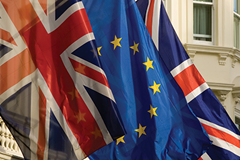Referendum plan opens up debate
 As David Cameron proposes a poll on the UK’s EU membership, agendaNi sums up the positions of the local parties.
As David Cameron proposes a poll on the UK’s EU membership, agendaNi sums up the positions of the local parties.
Britain and Ireland both marked 40 years in the European Union in January but while one country was chairing the EU’s council of ministers, another was raising the prospect of leaving altogether.
David Cameron’s keynote speech on Europe pledged a referendum on EU membership if the Conservatives won the next general election. The poll would take place by December 2017. In the meantime, the UK Government will seek a transfer of power from Brussels back to Westminster.
Britain’s negotiating position is, as yet, unclear. The 2010 Conservative manifesto said that three policy areas should be returned: criminal justice; social and employment legislation; and the Charter of Fundamental Rights.
He made his announcement after coming under increasing pressure from Eurosceptic backbenchers. Ed Miliband has warned that this will cause “years of uncertainty” for investors, a view echoed by Nick Clegg. Locally, the DUP, TUV and UKIP have consistently opposed EU membership. The SDLP, Alliance and the Green Party are strongly pro-European. Sinn Féin and the UUP support membership but oppose further integration.
Jim Nicholson, a UUP MEP since 1989, concurred with the Prime Minister. He wanted to see the EU becoming “a more competitive and flexible organisation” that could compete in a “fierce global environment.”
Nicholson called for an “informed debate based on the facts” which covered the UK’s financial contributions and gains, the impact of the single market on jobs and trade, European funding and the costs and benefits derived from European legislation.
“Less Europe is good for the UK, good for the governance and democracy of this country, and good for Northern Ireland’s businesses and householders,” DUP MEP Diane Dodds said. She welcomed Cameron’s proposal but recalled that he had reneged on a referendum for the Lisbon Treaty.
Her Sinn Féin counterpart, Martina Anderson, supported a referendum in principle but added that a British exit from the EU would have “serious repercussions for those living and doing business on either side of the border.”
The SDLP and Alliance Party both opposed a referendum and highlighted the EU’s benefits to Northern Ireland e.g. funding for peace, reconciliation and infrastructure, and the Common Agricultural Policy.
SDLP leader Alasdair McDonnell commented that Northern Ireland had “benefitted hugely” from UK and Irish EU membership. “Britain might well survive a long, painful breakdown in the European relationship but Northern Ireland would not,” he commented.
Alliance MLA Stewart Dickson warned that uncertainty over UK membership would lead international businesses to invest in countries with “more certain, long-term futures” in the EU and therefore threaten the UK’s fragile economic recovery.
In the 1975 referendum on European Common Market membership, 67.2 per cent of UK voters opted to stay in. The ‘yes’ vote in Northern Ireland was 52.1 per cent. No country has left the EU to date but Greenland (owned by Denmark) withdrew in 1985 to protect its fishing rights.
Eurosceptics point to the prosperity of Norway and Switzerland, outside the EU, but pro-Europeans contend that those countries have specific advantages (in oil and banking) and have to accept EU law without having a say on the decision-making process.





